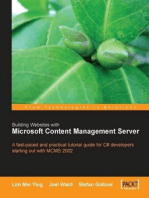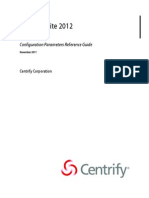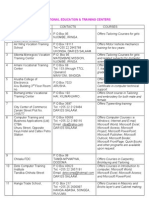3660 - Plan For Impact of Exchange On AD Directory Services
3660 - Plan For Impact of Exchange On AD Directory Services
Uploaded by
David Hung NguyenCopyright:
Available Formats
3660 - Plan For Impact of Exchange On AD Directory Services
3660 - Plan For Impact of Exchange On AD Directory Services
Uploaded by
David Hung NguyenOriginal Description:
Original Title
Copyright
Available Formats
Share this document
Did you find this document useful?
Is this content inappropriate?
Copyright:
Available Formats
3660 - Plan For Impact of Exchange On AD Directory Services
3660 - Plan For Impact of Exchange On AD Directory Services
Uploaded by
David Hung NguyenCopyright:
Available Formats
Design and Manage an
Exchange Infrastructure:
Plan for Impact of Exchange on AD
Directory Services
Plan for impact of Exchange on AD
directory services
This objective may include but is not
limited to:
Evaluate impact of schema changes required for
Exchange
Prepare domains for Exchange
Plan around Active Directory site topology
Plan the number of domain controllers
Plan placement of Global Catalog (GC)
Determine DNS changes required for Exchange
Company: Paraiso Brokerage
Firm handling private investment banking with
locations in Sao Paulo and Rio de Janeiro Brazil
Problem:
They are looking to acquire a new firm that
has AD but no existing Exchange environment
and they need to know what the impact will be
and what the AD configuration will involve
Goal:
Assess the existing infrastructure and design
the AD elements prior to deployment
Scenario: Brazillian Brokerage
Exchange stores all of its configuration and recipient
information in Active Directory
Queries are constantly made back to AD when an Exchange
server needs configuration or recipient information so you
can see how essential it is for AD to be available
Exchange is an AD site-aware application and prefers to
communicate with AD servers in the same site
Upon start, Exchange binds to a random DC and GC in its own site
You can use the Get-ExchangeServer cmdlet to discover which DC
and GC and use the Set-ExchangeServer cmdlet to configure a static
list it should bind to
Exchange 2013 and Active Directory
There are schema configuration changes with Exchange 2013 (as
with every release of Exchange since 2000)
To prepare AD you first need to prepare the Schema (which can
be done when installed your first Exchange server in your
environment or through PowerShell prior to the installation)
setup /PrepareSchema (or setup /ps)
/IAcceptExchangeServerLicenseTerms
Optional: /DomainController
You must be a member of the Schema Admins and Enterprise
Admins group to run the command and it has to be run in the
same domain and site as the AD schema master
Active Directory Schema Changes
You should talk to your AD management team before
implementing a schema update (if one exists)
You should also test the update in a lab first
Backup your AD before you apply the schema updates
You can test for schema extension conflicts by using the
ADSchemaExtensionConflictAnalyzer.ps1
Impact of Schema Changes
You can skip the Schema prep and jump right to
/PrepareAD if your policy allows for it
/PrepareAD (/p) will create the Exchange container (if one
doesnt exist) and will configure all the organization
information within including role groups
Exp:
Setup /PrepareAD /OrganizationName <name>
Active Directory: /PrepareAD
To prepare local domains you can run the /PrepareDomain
(/pd) or to prepare all domains you can run
/PrepareAllDomans (/pad)
Creates the Microsoft Exchange System Objects in the root
domain partition
To run /PrepareDomain you must be a Domain Admins
group in the domain
To run /PrepareAllDomains you must be a member of the
Enterprise Admins group
Active Directory: /PrepareDomain
Global Catalog Servers: You must have at least one GC
server (for high availability you should have two)
Domain Controllers: You must have at least one writeable DC
server (for high availability you should have two)
Forest Functionality: Server 2003 or higher
DNS Support: Contiguous, Noncontiguous, Single Label and
Disjointed
IPv6: IPv6 is fully supported (but IPv4 must remain installed,
although you can disable it)
Active Directory Infrastructure
Design and Deployment Strategy
2 Domain Controllers:
DC, GC and AD Integrated
DNS Services
Two Edge Transport Servers Internet
BEx01
BEx02
BEx03
DAG
Witness
JBOD Array
Hardware LB
Split DNS allows you to configure different IP addresses for
the same host name (aka split horizon or split brain DNS)
Using split DNS can help you reduce the number of host
names you have to manage and reduces the number of
SAN names required for your SSL certificates
Example: End users uses owa.company.com both internally and
externally
Note: Microsoft recommends split DNS but it isnt
mandatory
DNS Suggestions
They have a clearer understanding of AD design
and deployment concerns
They dont see the need to break things down and
will use the two commands:
/PrepareAD and /PrepareAllDomains
They will also ensure they have at least 2 GCs in
each site (they currently have multiple DCs but
arent sure if they have multiple GCs)
Scenario: Paraiso Brokerage
Additional Research
Exchange 2013 Active Directory Schema Changes
http://technet.microsoft.com/en-us/library/bb738144(v=exchg.150).aspx
Testing for Active Directory Schema Extension Conflicts
http://technet.microsoft.com/en-us/library/testing-for-active-directory-
schema-extension-conflicts(WS.10).aspx
Deploying Exchange 2013 (petenetlive.com)
http://www.petenetlive.com/KB/Article/0000730.htm#EX10
You might also like
- CIS 2154 - Ch. 2 WorksheetDocument8 pagesCIS 2154 - Ch. 2 WorksheetStrider PutnamNo ratings yet
- UI UX DesignDocument13 pagesUI UX Designmohammed aljubairi100% (2)
- 10135B ENU Handbook PDFDocument711 pages10135B ENU Handbook PDFnilber_morianoNo ratings yet
- Traffic Alert/Advisory System: SKY899 Installation ManualDocument155 pagesTraffic Alert/Advisory System: SKY899 Installation ManualG100% (1)
- Active Directory:: Server Manager Command LineDocument4 pagesActive Directory:: Server Manager Command Linetuan83No ratings yet
- Case Study 1: Contoso, LTD: Active DirectoryDocument39 pagesCase Study 1: Contoso, LTD: Active DirectorychubijonesNo ratings yet
- Module 1Document19 pagesModule 1safNo ratings yet
- Prepare Active Directory and Domains For Exchange 2013 PDFDocument18 pagesPrepare Active Directory and Domains For Exchange 2013 PDFAdam DanielNo ratings yet
- Notes - IQ'sDocument313 pagesNotes - IQ'skoppula_srinivasNo ratings yet
- ADS Ex Server 0307 QandA VasRao 02jul09Document46 pagesADS Ex Server 0307 QandA VasRao 02jul09PandianNo ratings yet
- CHAP TE R 5 Inst y Adm AD Lecc1Document18 pagesCHAP TE R 5 Inst y Adm AD Lecc1Deejay JuanitoNo ratings yet
- Ad Qu. Ans.Document4 pagesAd Qu. Ans.Roddur RayNo ratings yet
- Exchange Server 2013 InstallationDocument38 pagesExchange Server 2013 InstallationMuhammad Atif RamzanNo ratings yet
- Corvit 70-413Document129 pagesCorvit 70-413Arslan SaleemNo ratings yet
- M1 - Lesson 2 Overview of AD DS Domain ControllersDocument5 pagesM1 - Lesson 2 Overview of AD DS Domain Controllersvictor shahzadNo ratings yet
- 70-236 Lesson03 IG 030609Document7 pages70-236 Lesson03 IG 030609Nolan HiltonNo ratings yet
- Windows Server 2008 r2 Interview Questions and Answers Part1Document6 pagesWindows Server 2008 r2 Interview Questions and Answers Part1vijblrNo ratings yet
- Accepted Domains FactsDocument120 pagesAccepted Domains FactsBalajee RaoNo ratings yet
- 10 Ad BenchmarksDocument5 pages10 Ad Benchmarksapi-26424101No ratings yet
- 3 Deploying Exchange Server 2010Document4 pages3 Deploying Exchange Server 2010Sukhbir BhattiNo ratings yet
- AZ-800 Exam Updated Dumps - Administering Windows Server Hybrid Core InfrastructureDocument34 pagesAZ-800 Exam Updated Dumps - Administering Windows Server Hybrid Core Infrastructuretimblin843No ratings yet
- Surviving Microsoft Active Directory Failures With RubrikDocument30 pagesSurviving Microsoft Active Directory Failures With RubrikSAMSUNGGROUP3gmail.com DenisNo ratings yet
- 1.1 SitesDocument4 pages1.1 SitesShehroxe KhanNo ratings yet
- Ac DCDocument10 pagesAc DCSdferwste SrqreNo ratings yet
- 3648 - Plan The Mailbox RoleDocument5 pages3648 - Plan The Mailbox RoleDavid Hung NguyenNo ratings yet
- Microsoft Official Course: Designing and Implementing An Active Directory Domain Services TopologyDocument46 pagesMicrosoft Official Course: Designing and Implementing An Active Directory Domain Services TopologyZiad AbdoNo ratings yet
- AD QuestionsDocument4 pagesAD QuestionsSachin KurhadeNo ratings yet
- FAQ's On Active DirectoryDocument3 pagesFAQ's On Active DirectoryRaja MozumderNo ratings yet
- Essential Services To Configure in Windows Server For Cloud ServiceDocument8 pagesEssential Services To Configure in Windows Server For Cloud Serviceshadowalker2276No ratings yet
- Planning and Implementing The Active Directory InfrastructureDocument77 pagesPlanning and Implementing The Active Directory InfrastructureAjay GhosalkarNo ratings yet
- SQL Server 2019 High Availability (SQL Server Simplified)Document171 pagesSQL Server 2019 High Availability (SQL Server Simplified)amit_post2000No ratings yet
- 2003 To 2008 Active DirectoryDocument7 pages2003 To 2008 Active DirectoryLee Wiscovitch100% (8)
- Skipped: Practice Exam 2 - ResultsDocument42 pagesSkipped: Practice Exam 2 - ResultsAkash PaulNo ratings yet
- Install Active Directory Domain Services PDFDocument82 pagesInstall Active Directory Domain Services PDFds0909@gmail100% (1)
- Aws Csa 5Document13 pagesAws Csa 5tookilos biblexNo ratings yet
- 4 5800990461581598689Document3 pages4 5800990461581598689Reem NazeerNo ratings yet
- Installing Exchange Server 2016 PreDocument33 pagesInstalling Exchange Server 2016 PreBablu SonNo ratings yet
- 70-640 Study NotesDocument18 pages70-640 Study NoteskerryconsultingNo ratings yet
- Prepking 70-297 Exam QuestionsDocument11 pagesPrepking 70-297 Exam Questionsarron657No ratings yet
- Sridhar RapalaDocument3 pagesSridhar RapalaPraveen MadupuNo ratings yet
- UPDATED 70-743 Upgrading Your Skills To MCSA Windows Server 2016 - 248 QuestionsDocument273 pagesUPDATED 70-743 Upgrading Your Skills To MCSA Windows Server 2016 - 248 Questionsdafav86112No ratings yet
- 2003 A 2008purposeDocument29 pages2003 A 2008purposeCristian Leiva LNo ratings yet
- Microsoft Active Directory QuestionsDocument35 pagesMicrosoft Active Directory QuestionsPrabhu BasavaNo ratings yet
- What Is Active DirectoryDocument9 pagesWhat Is Active Directorypravesh12345No ratings yet
- Implementing Active Directory: Lesson 2Document36 pagesImplementing Active Directory: Lesson 2Deepak MalusareNo ratings yet
- Daniel RESUMEDocument9 pagesDaniel RESUMEHARSHANo ratings yet
- Deploying Exchange Server 2016Document26 pagesDeploying Exchange Server 2016zolfa mohammedNo ratings yet
- 7nov14.30 - Upgrading Windows Server 2003-2008 Active Directory To Windows Server 2012 R2Document58 pages7nov14.30 - Upgrading Windows Server 2003-2008 Active Directory To Windows Server 2012 R2HaOtiCregNo ratings yet
- T Fs Administration CertificationDocument39 pagesT Fs Administration CertificationsaahebNo ratings yet
- Designing A Site InfrastructureDocument31 pagesDesigning A Site InfrastructureJones RibeiroNo ratings yet
- Aws Csa 6Document12 pagesAws Csa 6tookilos biblexNo ratings yet
- The Exchange 2016 Preferred ArchitectureDocument5 pagesThe Exchange 2016 Preferred ArchitectureNavneetMishraNo ratings yet
- MicrosoftMicrosoft - ActualTests.70-412.v2015-12-30.by - GabbyDigital.362q.pdf - Actualtests.70 412.v2015!12!30.by - Gabbydigital.362qDocument497 pagesMicrosoftMicrosoft - ActualTests.70-412.v2015-12-30.by - GabbyDigital.362q.pdf - Actualtests.70 412.v2015!12!30.by - Gabbydigital.362qErosNo ratings yet
- Exchange Interview Questions 2Document5 pagesExchange Interview Questions 2SamPrinceNo ratings yet
- Building Websites with Microsoft Content Management ServerFrom EverandBuilding Websites with Microsoft Content Management ServerRating: 3 out of 5 stars3/5 (2)
- Microsoft Office 365 – Exchange Online Implementation and Migration - Second EditionFrom EverandMicrosoft Office 365 – Exchange Online Implementation and Migration - Second EditionNo ratings yet
- Exam AZ-800: Administering Windows Server Hybrid Core Infrastructure PreparationFrom EverandExam AZ-800: Administering Windows Server Hybrid Core Infrastructure PreparationNo ratings yet
- Mastering Microsoft Dynamics NAV 2016: The compilation of best skillset to harness Microsoft Dynamics NAV for Administrators, Consultants, and DevelopersFrom EverandMastering Microsoft Dynamics NAV 2016: The compilation of best skillset to harness Microsoft Dynamics NAV for Administrators, Consultants, and DevelopersNo ratings yet
- 3662 - Plan and Manage Role Based Access Control RBACDocument5 pages3662 - Plan and Manage Role Based Access Control RBACDavid Hung NguyenNo ratings yet
- 3656 - Plan and Configure Namespaces and Client ServicesDocument4 pages3656 - Plan and Configure Namespaces and Client ServicesDavid Hung NguyenNo ratings yet
- 3658 - Implement Load BalancingDocument6 pages3658 - Implement Load BalancingDavid Hung NguyenNo ratings yet
- 3648 - Plan The Mailbox RoleDocument5 pages3648 - Plan The Mailbox RoleDavid Hung NguyenNo ratings yet
- 3644 - Design A Transport SolutionDocument6 pages3644 - Design A Transport SolutionDavid Hung NguyenNo ratings yet
- 3655 - Plan Deploy and Manage A Client Access Server CASDocument4 pages3655 - Plan Deploy and Manage A Client Access Server CASDavid Hung NguyenNo ratings yet
- 3654 - Manage Mail Enabled Object PermissionsDocument4 pages3654 - Manage Mail Enabled Object PermissionsDavid Hung NguyenNo ratings yet
- 3642 - Course Scenario and Lab SetupDocument2 pages3642 - Course Scenario and Lab SetupDavid Hung NguyenNo ratings yet
- Wordware Publishing - Lightwave 3d Character AnimationDocument497 pagesWordware Publishing - Lightwave 3d Character AnimationScorpiken100% (1)
- ADFS InstallDocument101 pagesADFS InstallDavid Hung NguyenNo ratings yet
- Zope BibleDocument649 pagesZope BibleDavid Hung NguyenNo ratings yet
- Centrify PuTTYDocument17 pagesCentrify PuTTYzzkknjNo ratings yet
- Aded It GuideDocument318 pagesAded It GuideDavid Hung NguyenNo ratings yet
- DirectAudit Release NotesDocument10 pagesDirectAudit Release NotesDavid Hung NguyenNo ratings yet
- Config ParametersDocument164 pagesConfig ParametersDavid Hung NguyenNo ratings yet
- MacOS AdminDocument234 pagesMacOS AdminDavid Hung Nguyen100% (1)
- IBM System x3850 X5 and x3950 X5: Maximize Memory, Minimize Cost and Simplify DeploymentDocument4 pagesIBM System x3850 X5 and x3950 X5: Maximize Memory, Minimize Cost and Simplify DeploymentDavid Hung NguyenNo ratings yet
- Usersguide QCC Gui Sn0054669-00dDocument50 pagesUsersguide QCC Gui Sn0054669-00dDavid Hung NguyenNo ratings yet
- BSM SQLSvrPerfomanceOptimizationGuideDocument16 pagesBSM SQLSvrPerfomanceOptimizationGuideDavid Hung NguyenNo ratings yet
- Infoblox IPAM Freeware License AgreementDocument1 pageInfoblox IPAM Freeware License AgreementDavid Hung NguyenNo ratings yet
- EasyBuilder Pro UserManual PDFDocument676 pagesEasyBuilder Pro UserManual PDFΟικογένεια ΣωτηρίουNo ratings yet
- Vehicle InvoiceDocument2 pagesVehicle InvoiceSHAKTI INSURANCENo ratings yet
- JavaeffectiveDocument4 pagesJavaeffectivelucedero kuvasakoNo ratings yet
- U.S. E G P: Application FormatDocument3 pagesU.S. E G P: Application FormatLena FosterNo ratings yet
- Korf ManualDocument95 pagesKorf Manuallhphong021191No ratings yet
- CCS375 Set1Document3 pagesCCS375 Set1kayalvizhi.1285No ratings yet
- Speed Control of Induction Motor Using Android Application: Varute Gaurav Bhausaheb (ROLL NO. 52)Document16 pagesSpeed Control of Induction Motor Using Android Application: Varute Gaurav Bhausaheb (ROLL NO. 52)Gaurav VaruteNo ratings yet
- LSN Lesson Plan 10Document5 pagesLSN Lesson Plan 10DelNo ratings yet
- Xi Computer Science QP Cae - Feb - Mar 2024Document5 pagesXi Computer Science QP Cae - Feb - Mar 2024gsss lapathyNo ratings yet
- AWS Products CompareDocument3 pagesAWS Products CompareHemantNo ratings yet
- Thesis Footer ExampleDocument4 pagesThesis Footer Examplegj6sr6d7100% (2)
- Vocational Education & Training CentersDocument5 pagesVocational Education & Training CentersrobbymkelloNo ratings yet
- Better Faster More Efficient Verification With AiDocument6 pagesBetter Faster More Efficient Verification With AiNavya RavutlaNo ratings yet
- GM Tech Magazine :: Issue EightDocument37 pagesGM Tech Magazine :: Issue EightgamemakertechNo ratings yet
- Executive Information Systems (EIS) : Group 24 AH20124 - Pareek Urvashi AH20139 - Grace LoisDocument11 pagesExecutive Information Systems (EIS) : Group 24 AH20124 - Pareek Urvashi AH20139 - Grace LoisAadhira BhardwajNo ratings yet
- Xss PayloadsDocument17 pagesXss PayloadsBrijesh palNo ratings yet
- Module 5-3 - Computer-ForensicsDocument43 pagesModule 5-3 - Computer-Forensicsdungnthe172688No ratings yet
- GLUT Shapes Dem-WPS OfficeDocument7 pagesGLUT Shapes Dem-WPS OfficeAgs SlmNo ratings yet
- Mo-Hinh-Hoa - Hoang-Ngoc-Ha - Bai - Giang - Toiuuhoa - (Cuuduongthancong - Com)Document23 pagesMo-Hinh-Hoa - Hoang-Ngoc-Ha - Bai - Giang - Toiuuhoa - (Cuuduongthancong - Com)anh thoNo ratings yet
- Movies 16Document182 pagesMovies 16Ilham Sneil RohmanNo ratings yet
- Localization SupportDocument36 pagesLocalization SupportChristian RodríguezNo ratings yet
- 11 Lab1 Python StudsDocument16 pages11 Lab1 Python StudsZul ZahidNo ratings yet
- Blockchain For Iot: The Challenges and A Way Forward: July 2018Document13 pagesBlockchain For Iot: The Challenges and A Way Forward: July 2018ronicaNo ratings yet
- Yamaha PSR-9000 File FormatsDocument24 pagesYamaha PSR-9000 File FormatsJuan Luis Rojas SaleguiNo ratings yet
- 840Dsl 828D OPCUA Config Man 1218 en-USDocument120 pages840Dsl 828D OPCUA Config Man 1218 en-USoutlanderoneNo ratings yet
- Computer Aided Manufacturing NotesDocument34 pagesComputer Aided Manufacturing NotesNyaabaNo ratings yet
- Muhamad Gumelar Data Analyst Portofolio DQLAB 1638845538Document15 pagesMuhamad Gumelar Data Analyst Portofolio DQLAB 1638845538klimpungNo ratings yet
- Catalogo Biomédico 2016 PDFDocument36 pagesCatalogo Biomédico 2016 PDFMartinNo ratings yet












































































































